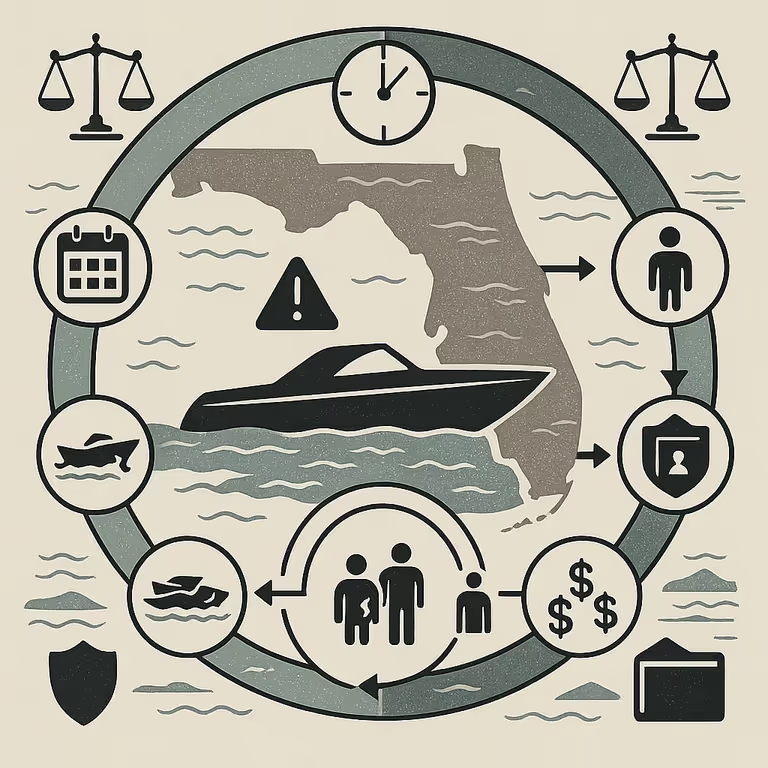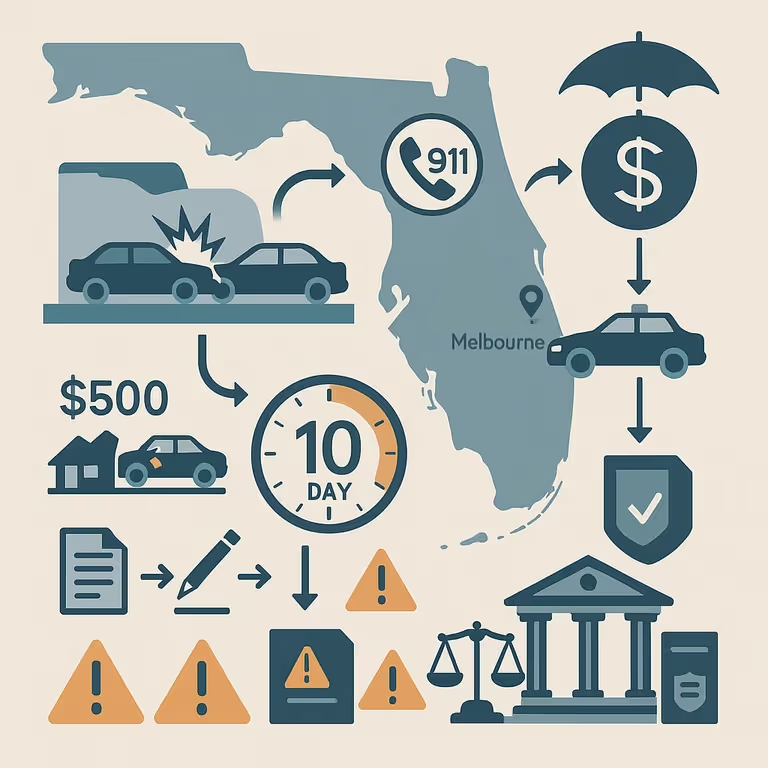Florida Car Insurance Requirements: What Melbourne Drivers Must Know in 2025
Learn about Florida's mandatory car insurance requirements, how they may change in 2025, & why Melbourne drivers need more than the minimum protection.
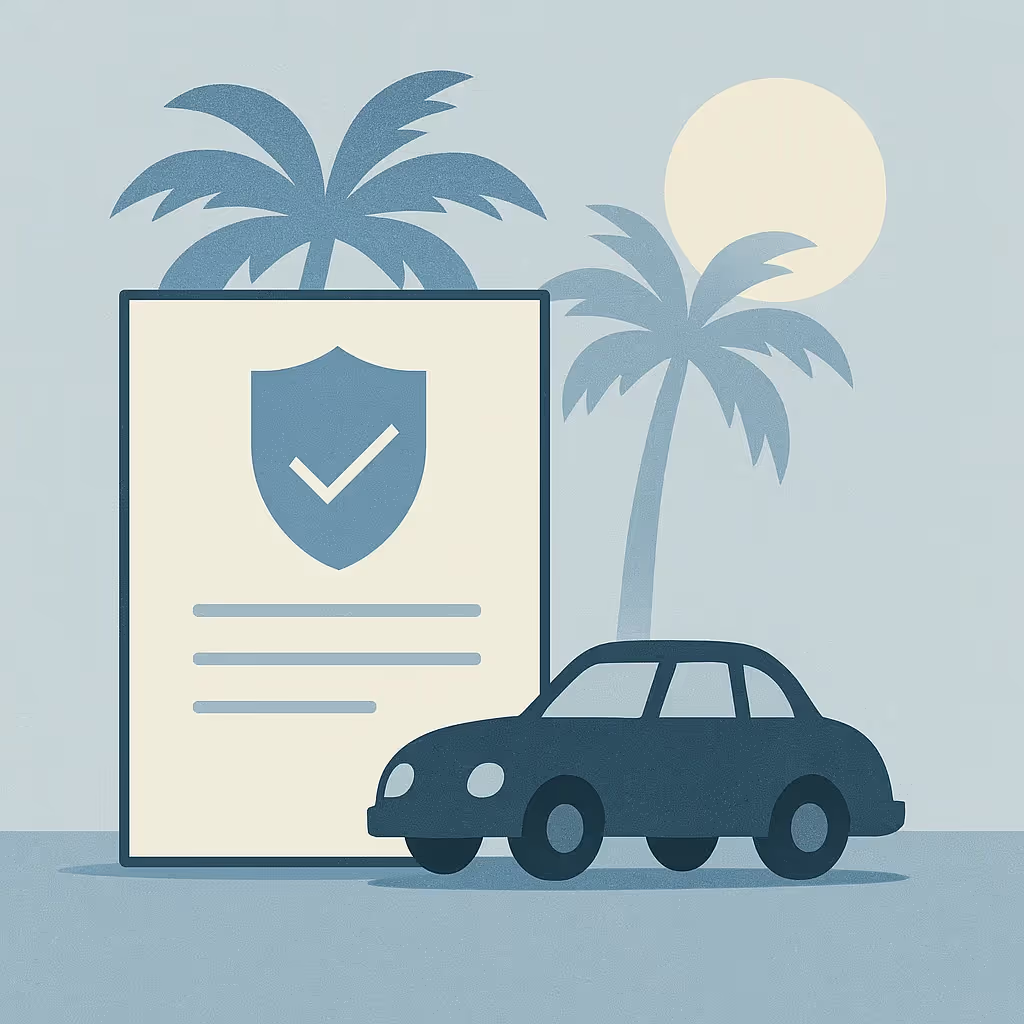
- Florida operates under a no-fault insurance system requiring drivers to carry Personal Injury Protection and Property Damage Liability coverage, though these minimum requirements often provide inadequate protection in serious accidents.
- With nearly one in six Florida drivers being uninsured, purchasing uninsured/underinsured motorist coverage provides crucial financial protection beyond the state-mandated minimums.
- Florida drivers must seek medical attention within fourteen days of an accident to qualify for Personal Injury Protection benefits, making prompt medical care essential for insurance coverage.
Worried About Your Injury Case? We'll Review It - Free!
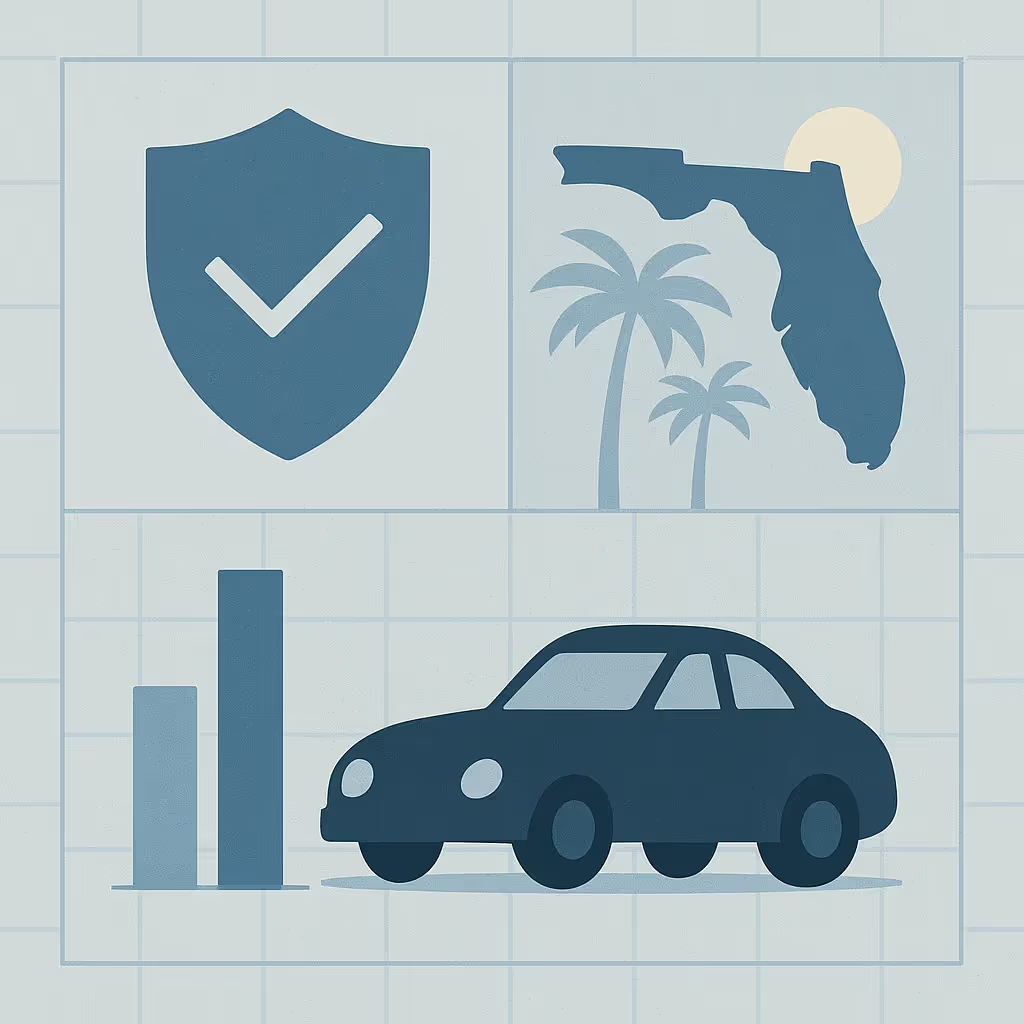

Florida ranks among the worst states in the nation for uninsured motorists. A startling 15.9% of drivers—nearly one in six—travel Florida's roads without any insurance coverage, according to the Insurance Information Institute's 2022 study. For Melbourne residents, this creates a dangerous financial risk every time you get behind the wheel.
So, does Florida require car insurance? Absolutely. State law mandates specific minimum coverage for all registered vehicles, though Florida's requirements differ significantly from most other states. Unlike the majority of states that operate under a fault-based system, Florida uses a no-fault insurance framework, which fundamentally changes how accident claims are processed and what coverage you must carry.
This no-fault system means your own insurance pays for your medical expenses regardless of who caused the accident—a concept that often confuses drivers who move to Florida from other states. Despite multiple legislative attempts to repeal this system (most recently with HB 1181 in 2025), the no-fault framework remains firmly in place. Let's examine exactly what these mandatory insurance requirements entail and why they often provide insufficient protection for serious accidents.
Florida's Current Mandatory Insurance Requirements
Florida operates under a no-fault insurance system that requires specific minimum coverage for all registered vehicles. Under this system, your own insurance pays for your injuries regardless of who caused the accident, which differs significantly from fault-based systems in many other states.
Personal Injury Protection (PIP) Coverage
Personal Injury Protection, commonly known as PIP, is coverage that pays for your medical expenses regardless of who caused the accident. Florida law requires all drivers to carry a minimum of $10,000 in PIP coverage. This coverage pays for 80% of necessary and reasonable medical expenses resulting from a covered injury.
PIP typically covers:
- Medical bills including hospital stays, surgery, and rehabilitation
- Lost wages if your injuries prevent you from working (up to 60% of your lost income)
- Replacement services for tasks you can't perform due to injuries
- A death benefit of $5,000 in addition to medical benefits
Most insurance companies offer PIP with various deductible options ranging from $0 to $1,000. Selecting a higher deductible can lower your premium but increases your out-of-pocket costs if you need to file a claim.
To qualify for PIP benefits, you must seek medical treatment within 14 days of the accident—a crucial deadline that many injured drivers unfortunately miss.
Property Damage Liability (PDL) Coverage
Property Damage Liability (PDL) is coverage that pays for damage you cause to another person's property in an accident. Florida requires a minimum of $10,000 in PDL coverage.
PDL coverage typically pays for:
- Damage to other vehicles involved in an accident you cause
- Damage to structures such as fences, buildings, or utility poles
- Damage to other property such as mailboxes or yard features
It's important to note that PDL does NOT cover damage to your own vehicle. For that protection, you would need to purchase optional collision coverage. This key limitation is why we recommend speaking with our car accident lawyers about coverage beyond the state minimums.
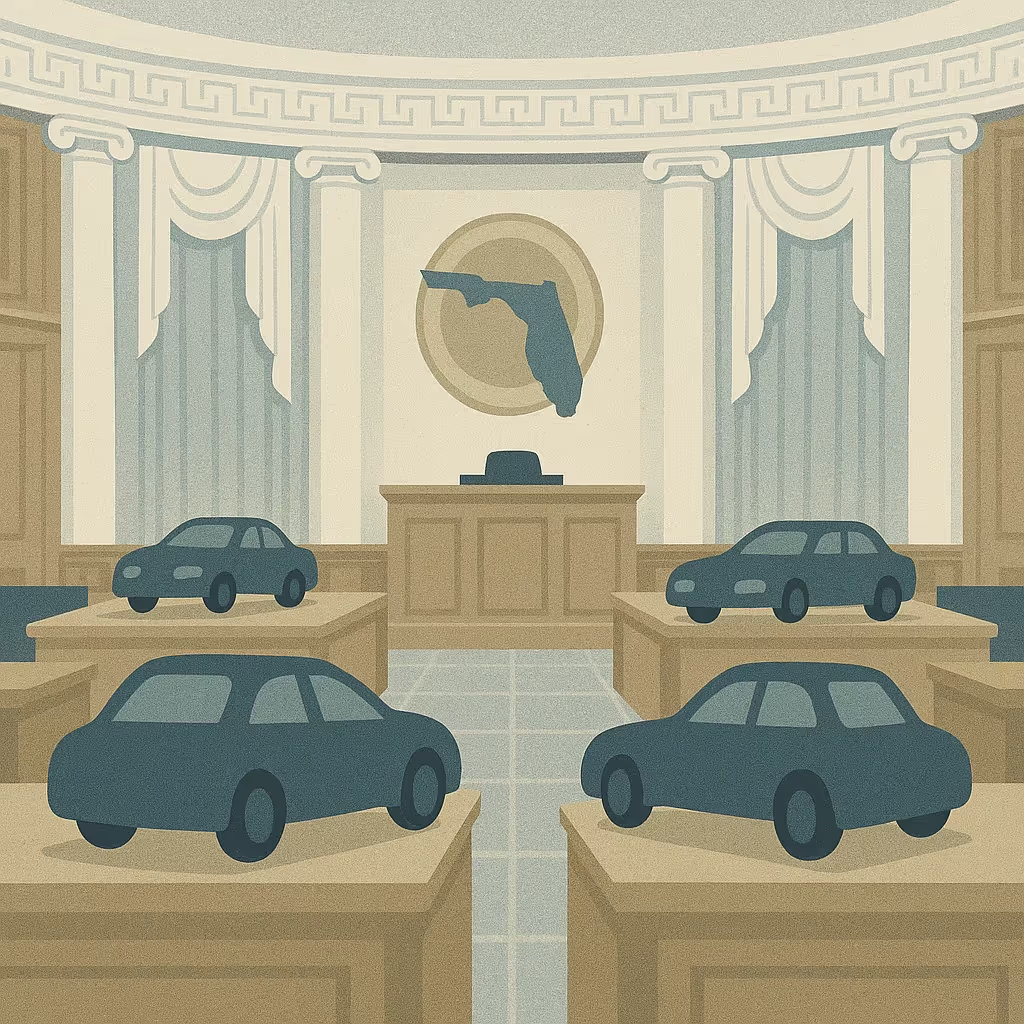
Understanding Florida's No-Fault Insurance System
Florida's no-fault insurance system fundamentally changes how accident claims are handled compared to fault-based states. This system was designed to reduce litigation and ensure prompt payment of medical bills regardless of who caused the accident.
How the No-Fault System Affects Accident Claims
Under Florida's no-fault system, each driver's insurance pays for their own injuries regardless of who caused the accident. This means that after an accident, you generally file a claim with your own insurance company for your medical expenses, not with the at-fault driver's insurance.
However, the no-fault system has important limitations. You can step outside the no-fault system and file a lawsuit against the at-fault driver only if your injuries meet certain thresholds:
- Significant and permanent loss of an important bodily function
- Permanent injury within a reasonable degree of medical probability
- Significant and permanent scarring or disfigurement
- Death
If you've been seriously injured in an accident, our personal injury lawyers can help you determine if your case meets Florida's threshold for stepping outside the no-fault system.
Property damage claims are handled differently than injury claims. Despite being a no-fault state, Florida still follows a traditional fault-based approach for vehicle and property damage. This means the at-fault driver's Property Damage Liability coverage pays for damage to your vehicle.
Verification of Insurance Requirements
When registering a vehicle in Florida, you must provide proof of PIP and PDL insurance that meets the state's minimum requirements. This documentation must be from an insurance company licensed to do business in Florida.
Florida uses an electronic database to verify insurance coverage. The Florida Insurance Database cross-references your vehicle information with insurance company records to ensure compliance. If the system detects that your vehicle lacks required insurance, you will receive a notice requiring proof of coverage.
Driving without insurance in Florida carries serious penalties, including:
- Suspension of your driver's license and vehicle registration for up to three years
- Reinstatement fees ranging from $150 to $500 depending on previous violations
- Requirement to file an SR-22 form (proof of financial responsibility)
- Potential requirement to carry higher coverage limits
Florida's Continued Commitment to the No-Fault Insurance System
Florida's no-fault auto insurance system, established in the 1970s, continues to demonstrate remarkable resilience despite repeated legislative attempts to replace it. Most recently, House Bill 1181 (2025) joined a growing list of failed reform efforts when it was "indefinitely postponed and withdrawn from consideration" on May 3, 2025.
The Persistent Pattern of PIP Reform Attempts
For over a decade, Florida legislators have introduced bills attempting to repeal the state's Personal Injury Protection (PIP) requirement:
- In 2021, similar legislation (SB 54) passed both chambers but was ultimately vetoed by Governor DeSantis.
- In 2023, another attempt gained traction before stalling in committee.
- Most recently, HB 1181 in 2025 proposed:
- Eliminating the current $10,000 PIP requirement
- Implementing mandatory bodily injury liability coverage
- Shifting from a no-fault to a fault-based system for injury claims
- New requirements for medical payment coverage options
- Modified bad faith provisions related to insurance claims
Despite initial momentum and favorable committee votes in March and April 2025, this latest attempt met the same fate as its predecessors—failure to become law.
Why Florida Remains Committed to No-Fault Insurance
Florida's continued adherence to the PIP system appears driven by several factors:
- Executive Resistance: Governor DeSantis has consistently opposed repealing the no-fault system, citing concerns about potential premium increases for Florida drivers.
- Industry Stability Concerns: The insurance market in Florida already faces significant challenges, and a fundamental restructuring raises questions about market disruption.
- Consumer Protection Considerations: While imperfect, the current system ensures that injured parties receive some immediate medical benefits regardless of fault determination.
- Legislative Complexity: The intricacies of balancing consumer costs, coverage adequacy, and market stability have repeatedly proven difficult to reconcile in proposed legislation.
What This Means for Melbourne Drivers
For drivers in Melbourne and throughout Florida, the practical implication is straightforward: the existing PIP system remains in effect for the foreseeable future. This means:
- You must maintain at least $10,000 in PIP coverage
- Your own insurance continues to cover your medical expenses and lost wages up to policy limits regardless of fault
- The familiar benefits and limitations of the no-fault system remain unchanged
The consistent failure of repeal efforts, including this most recent 2025 attempt, suggests that while periodic legislative challenges will likely continue, Florida drivers should anticipate operating under the no-fault framework for years to come.

Why Minimum Coverage May Not Be Enough
While Florida law establishes minimum insurance requirements, these requirements provide very limited financial protection in the event of a serious accident. Understanding the true costs of accidents is essential for making informed decisions about your coverage.
The Real Costs of Car Accidents
The reality is that Florida's minimum requirements often fall far short of covering actual costs when serious accidents occur:
- The average cost of a non-fatal injury accident can range from $20,000 to over $100,000, depending on injury severity—well beyond the $10,000 PIP limit
- Hospital stays, surgeries, and rehabilitation can quickly exhaust the $10,000 PIP coverage
- Lost wages due to injuries might continue long after the 60% wage loss coverage from PIP runs out
- Property damage often exceeds the $10,000 PDL minimum, especially when multiple vehicles are involved
Serious accidents often result in catastrophic injuries that can lead to traumatic brain injury claims or other significant damages that far exceed minimum coverage limits. Even a seemingly minor accident with soft tissue injuries and moderate vehicle damage can easily exceed $15,000 in total costs. More serious accidents involving surgeries, extended recovery periods, or permanent injuries can result in hundreds of thousands of dollars in medical bills, lost income, and other damages.
Recommended Additional Coverage Types
Based on these realities, our attorneys recommend several additional coverage types beyond Florida's minimum requirements:
Bodily Injury Liability: This covers injuries to others when you're at fault in an accident. While not currently required in Florida, we recommend at least $50,000 per person and $100,000 per accident (often written as 50/100).
Uninsured/Underinsured Motorist Coverage: With Florida's uninsured motorist rate at 15.9%, this coverage is crucial. It protects you if you're hit by a driver with no insurance or inadequate coverage. We recommend matching this to your bodily injury limits.
Comprehensive and Collision Coverage: These optional coverages pay for damage to your own vehicle regardless of fault. Comprehensive covers non-accident damage (theft, weather, falling objects), while collision covers accident damage to your vehicle.
Medical Payments Coverage: This supplement to PIP covers medical expenses for you and your passengers without the 80% limitation of PIP, helping to fill the 20% gap that PIP doesn't cover.
Higher PDL Limits: Increasing your property damage liability beyond the $10,000 minimum provides better protection if you damage expensive vehicles or property.
Cost-Benefit Analysis of Higher Coverage Limits
Many drivers are surprised to learn that substantially higher coverage limits often cost proportionally less than minimum coverage. For instance, doubling your coverage rarely doubles your premium. The price difference between minimum coverage and recommended coverage is often just $20-40 per month—a small price to pay for significantly enhanced protection.
Consider this example: A serious accident resulting in $75,000 of medical bills and $25,000 in property damage would leave you personally responsible for $90,000 with minimum coverage. With recommended coverage levels, your out-of-pocket responsibility might be zero.
The financial security of proper coverage provides peace of mind that far outweighs the modest premium increase. Our Melbourne clients who have experienced serious accidents consistently express gratitude for having adequate coverage in place before the unexpected occurred.
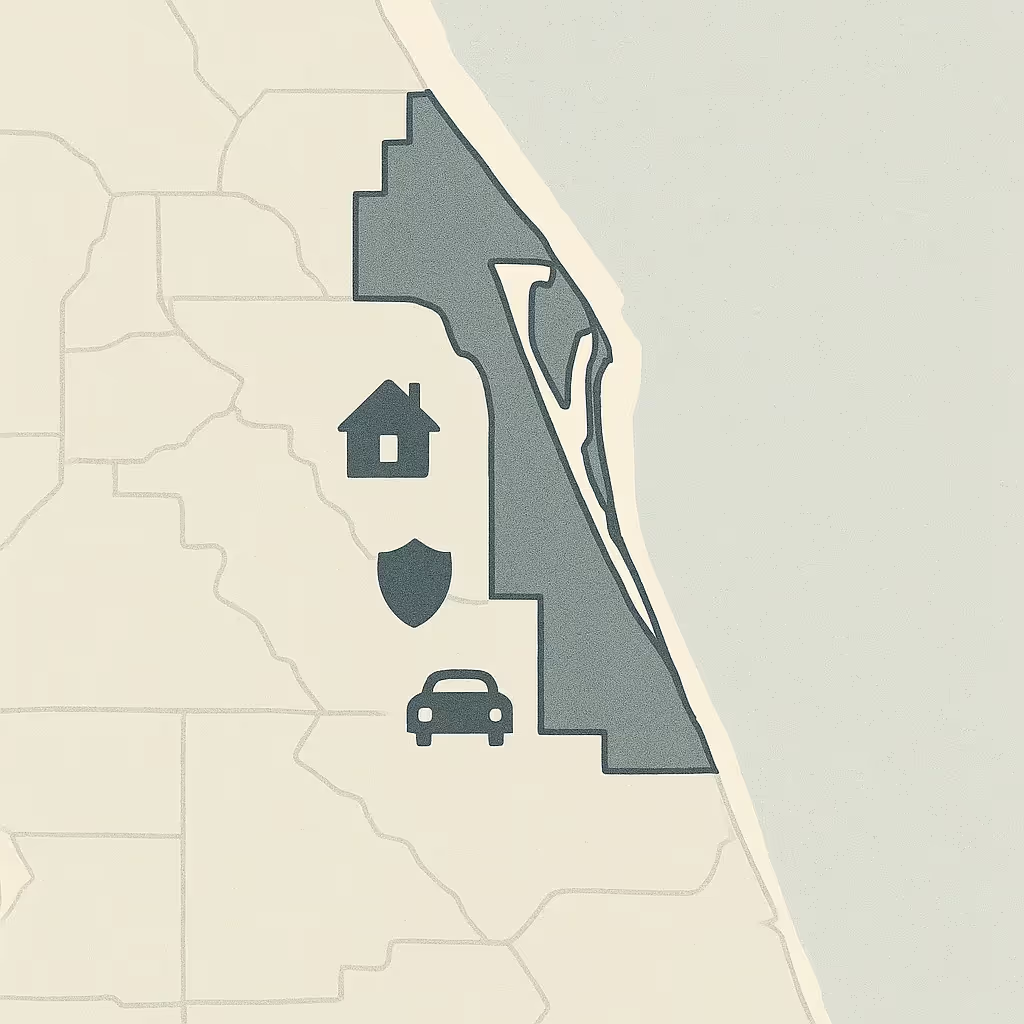
Melbourne & Brevard County Insurance Considerations
While Florida's insurance laws apply statewide, several local factors affect insurance needs and rates for Melbourne and Brevard County residents.
Local Traffic and Accident Patterns
Melbourne drivers face unique driving conditions that can influence both insurance rates and coverage needs:
- The Palm Bay-Melbourne-Titusville area is recognized as a distinct region in government data systems with its own traffic patterns and risk factors
- High-risk intersections like Babcock Street and Palm Bay Road, or Wickham Road and Sarno Road see higher accident rates
- Beachside areas experience increased traffic during tourist season, particularly along A1A through Indialantic, Melbourne Beach, and Satellite Beach
- Interstate 95 through Brevard County sees a high volume of high-speed traffic and commercial vehicles
- Seasonal weather events, particularly hurricane season from June through November, create additional risks for vehicle damage
Melbourne's unique traffic patterns create risks for accidents that can result in serious injuries requiring specialized legal representation. These local factors mean Melbourne drivers may face different accident risks than drivers in other parts of Florida, potentially affecting what coverage types and limits make the most sense.
Finding the Right Coverage in Melbourne
When shopping for insurance in Melbourne, consider these local strategies:
- Local insurance agents often understand Brevard County risk factors better than online quote systems
- Zip code-specific rates vary throughout Brevard County; Melbourne's 32901, 32904, and 32935 areas may have different rate structures
- Melbourne's proximity to Space Coast facilities, beaches, and tourist attractions creates unique risk factors that some insurers may handle differently
- Multi-policy discounts with local agents can often offset the cost of higher coverage limits
Many Melbourne residents find that independent agents who work with multiple insurance companies can provide more competitive options than single-company agents or online quotes. These agents can also provide valuable advice about Melbourne-specific coverage needs.
Special Considerations for Brevard County Residents
Several factors unique to Brevard County should influence your insurance decisions:
- Proximity to beaches means increased exposure to saltwater and sand, which can damage vehicles even without accidents
- Brevard County's Space Coast identity brings unique traffic patterns around launches and space-related events
- Tourist areas throughout the county increase the likelihood of encountering out-of-state drivers who may be unfamiliar with local roads
- Snowbirds and seasonal residents should ensure their coverage accounts for periods when vehicles may be unused or when they're traveling between states
For Melbourne residents, understanding these local factors can help you make more informed decisions about what insurance coverage will best protect you and your family while driving in our community.
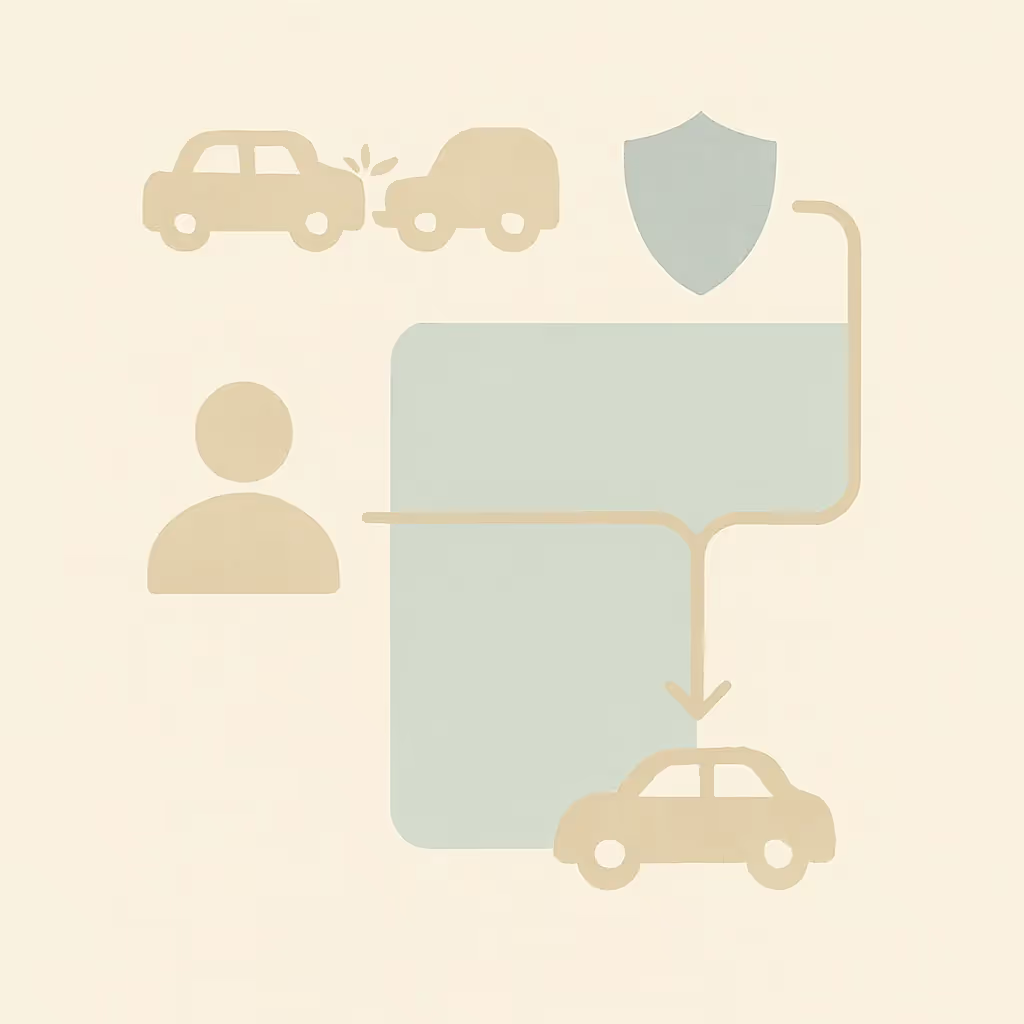
What To Do After a Car Accident in Florida
Knowing the proper steps to take after an accident is crucial for protecting both your health and your legal rights, especially considering Florida's unique insurance requirements.
Immediate Steps After an Accident
If you're involved in an accident in Melbourne or elsewhere in Florida, follow these critical first steps:
- Ensure safety first: Move to a safe location if possible and check for injuries
- Call 911: Report the accident, especially if there are injuries or property damage over $500 (required by Florida law)
- Exchange information: Collect names, contact information, insurance details, and vehicle information from all involved parties
- Document the scene: Take photos of all vehicles, damage, the accident location, road conditions, and any visible injuries
- Identify witnesses: Get contact information from any witnesses present
- Avoid admitting fault: Even saying "I'm sorry" can be interpreted as an admission of fault
- Report to police: If police respond, get the officer's name and badge number and request a copy of the accident report
Florida law requires you to report any accident involving injuries or property damage over $500. Failure to report can result in citations and may complicate your insurance claim.
Navigating the Insurance Claims Process
Florida's no-fault system creates a specific process for handling accident claims:
- Contact your insurance company immediately to report the accident, regardless of fault
- Seek medical attention within 14 days of the accident—this is critical as Florida law requires this for PIP benefits
- File your PIP claim with your own insurance company, providing all requested medical documentation
- For vehicle damage claims, file with the at-fault driver's insurance company if another driver caused the damage
- Keep detailed records of all medical treatments, expenses, and communications with insurance companies
- Be cautious when speaking with insurance adjusters, as their primary goal is minimizing payouts
- Consider having an attorney review any settlement offers before accepting
In cases where a family member has died due to another's negligence, our wrongful death lawyers can provide guidance on the additional legal considerations beyond typical insurance claims. Remember that PIP only covers 80% of your medical expenses up to the $10,000 limit. If your injuries are severe, you may need to pursue additional compensation through other coverage types or a personal injury claim.
When to Contact an Attorney
While minor accidents might be handled directly with insurance companies, several scenarios warrant consulting with an experienced Melbourne car accident attorney:
- Serious injuries requiring significant medical treatment
- Disputes about who caused the accident
- Insurance company denial of legitimate claims
- Injuries that might meet Florida's threshold for stepping outside the no-fault system
- Accidents involving uninsured or underinsured drivers
- Settlements offered that seem inadequate to cover your expenses
In Florida, you generally have two years from the date of the accident to file a personal injury lawsuit, but insurance claims have much shorter deadlines. An experienced attorney can ensure you meet all deadlines and maximize your recovery while you focus on healing.
Our Melbourne attorneys have successfully guided countless Brevard County residents through the complex post-accident process, ensuring they receive the compensation they deserve while navigating Florida's unique insurance requirements.
Frequently Asked Questions (FAQs)
Is Florida a no-fault state for car insurance?
Yes, Florida currently operates under a no-fault insurance system, meaning your own insurance pays for your injuries regardless of who caused the accident. However, this may change if Senate Bill 1256 passes, which would repeal the no-fault system and move Florida to a fault-based system for injury claims.
What happens if I drive without insurance in Florida?
Driving without insurance in Florida can result in suspension of your driver's license and vehicle registration for up to three years. To reinstate these privileges, you must pay reinstatement fees ranging from $150 to $500 depending on previous violations and provide proof of current insurance. You may also be required to file an SR-22 form proving financial responsibility.
How much car insurance am I required to have in Florida?
Florida currently requires $10,000 in Personal Injury Protection (PIP) and $10,000 in Property Damage Liability (PDL). However, these minimums provide very limited protection, and we strongly recommend additional coverage types and higher limits, including bodily injury liability, uninsured/underinsured motorist, comprehensive, and collision coverage.
Will my insurance rates go up if I'm in an accident that wasn't my fault?
In Florida's no-fault system, your rates may increase after an accident even if you weren't at fault, though this depends on your specific insurance company's policies. Some insurers offer accident forgiveness for not-at-fault accidents, while others may raise rates regardless of fault. Shopping around after a not-at-fault accident can sometimes help you find better rates.
How will Senate Bill 1256 affect my car insurance if it passes?
If passed, SB 1256 would eliminate the PIP requirement and instead require bodily injury liability coverage. This would fundamentally change how accident claims are handled in Florida, moving from a system where your own insurance pays for your injuries to one where the at-fault driver's insurance would be responsible. This could potentially affect premium costs and claim procedures for all Florida drivers.
What should I do if I'm hit by an uninsured driver in Melbourne?
If you're hit by an uninsured driver in Melbourne, your PIP coverage will cover some of your medical expenses, typically 80% up to the $10,000 limit. If you have uninsured motorist coverage, that will provide additional protection beyond PIP. Document everything thoroughly, get a police report, and consider consulting with a Melbourne car accident attorney to explore all potential sources of compensation.
Does Florida require bodily injury liability insurance?
Currently, Florida does not require bodily injury liability insurance, though this could change if Senate Bill 1256 passes. However, we strongly recommend carrying this coverage even though it's not mandatory. Without it, you could be personally responsible for paying others' medical bills if you cause an accident, potentially putting your personal assets at risk.
How long do I have to file a PIP claim after an accident in Florida?
You must seek initial medical treatment within 14 days of the accident to qualify for PIP benefits in Florida. This is a strict deadline—if you wait longer than 14 days to see a doctor, you may lose your right to PIP benefits entirely. Once you've received initial treatment, notify your insurance company promptly to begin the PIP claim process.
Conclusion
Understanding Florida's car insurance requirements is essential for Melbourne drivers, especially as the state considers potentially significant changes to its insurance laws. While the current no-fault system requires only PIP and PDL coverage, these minimums provide limited protection in the event of a serious accident.
We strongly recommend that Melbourne and Brevard County residents consider additional coverage types and higher limits to ensure adequate protection on our local roads. The modest premium increase for better coverage provides valuable peace of mind and financial security.
If you've been involved in an accident or have questions about your insurance coverage, our experienced Melbourne attorneys can help. Contact Douglas R. Beam, P.A. at (321) 723-6591 for a free consultation to review your insurance coverage and understand your rights after an accident.
Sources
- Insurance Information Institute
- Florida DHSMV Insurance Info
- FL Senate Bill 1256 (2025)
- FL Statute 627.736 - PIP Benefits
- FL DeSantis No-Fault Opposition
- FL Car Insurance Laws 2025
- FL Motor Vehicle Statutes
- FL House Bill Analysis
Not Sure What To Do Next? We Can Help – Fast & Free.
Worried About Your Injury Case?
We'll Review It - Free
Don’t miss an article
Florida law, local insights, and the occasional dog pic.
Delivered straight to your inbox.
More articles
Browse all articlesFree Case Review
Get a complimentary review of your case

.webp)
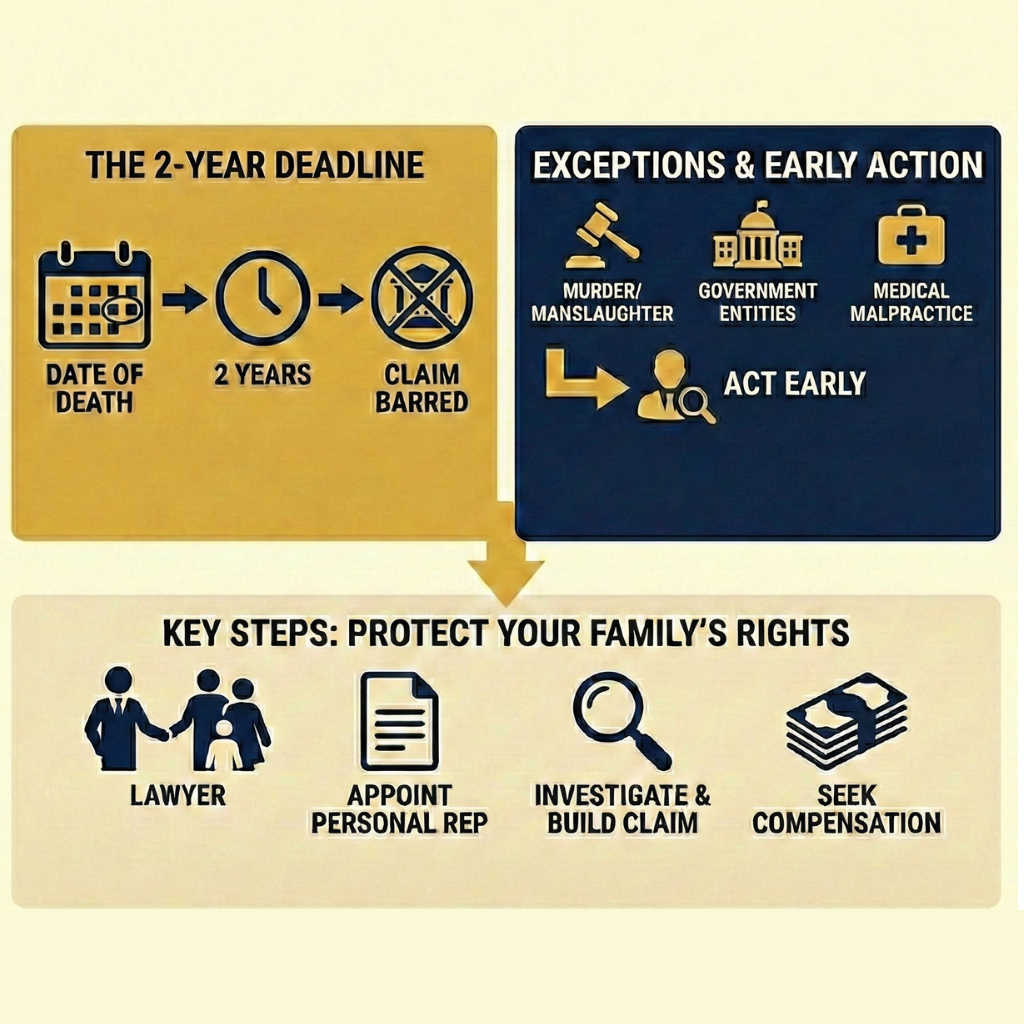
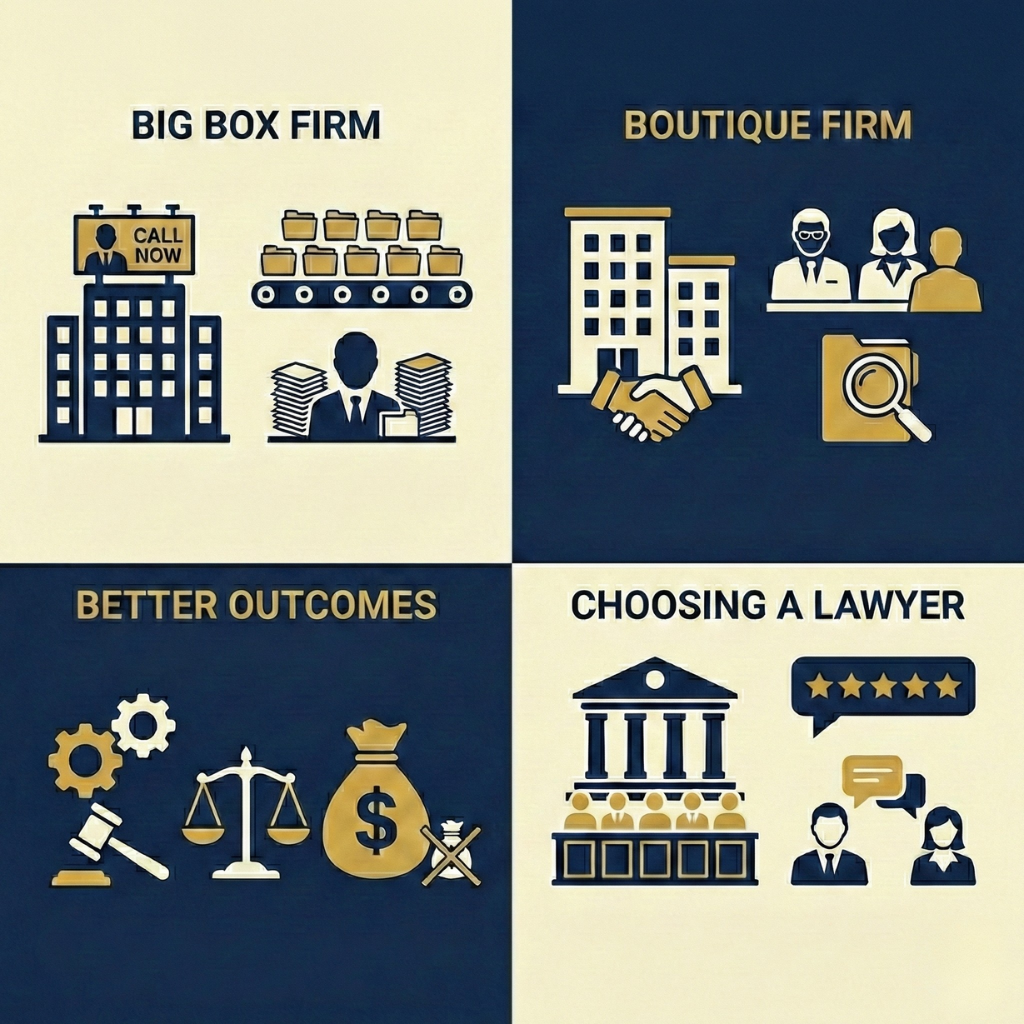
.png)
.png)
.png)
.png)

